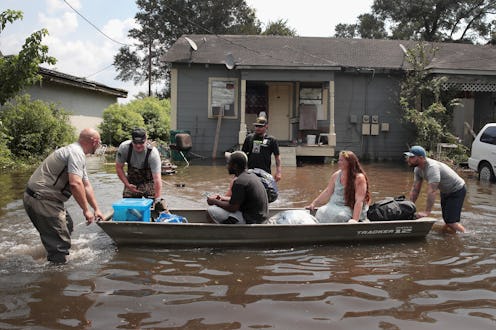News
The House Passes A Multi-Billion Dollar Aid Package For Hurricane Harvey Victims

Amidst congressional arguments over the spending limit and the debt ceiling, the House passed a $7.9 billion emergency Harvey aid package on Wednesday. The measure went through with overwhelming support, passing with a vote total of 419-3. The bill will now go to the Senate, where it is expected that the upper house will add language to the bill that will lift the debt ceiling before sending it back to the House for final approval.
Given the huge amount of damage that Harvey caused in Texas and Louisiana, this is likely to be the first of many federal aid packages that will go towards rebuilding after the storm. The vast scope of the damage is certainly what helped Democrats and Republicans unite over the measure, and while $7.9 billion represents only a very small proportion of what will be required, it does fulfill an urgent need.
CBS News reports that the grand majority of this sum will go directly to FEMA's Disaster Relief Fund, with a much smaller portion going to the Small Business Administration's disaster loan program. The rebuilding process will go far beyond just disaster relief, though, and current estimates say that Harvey's total cost could reach $190 billion — $10 billion higher than the previous most expensive storm ever, Hurricane Katrina in 2005.
September is a busy month for Congress, as they are running up against deadlines to both pass a spending bill and raise the debt ceiling. Treasury Secretary Steve Mnuchin asked Congress to tie Harvey aid funding to raising the debt limit, a strategy that's not entirely popular with Democrats. However, both Democrats and Republicans recognize that both getting Harvey victims immediate relief and raising the debt ceiling are of the utmost importance, and so it seems likely that the measure will indeed end up on the president's desk before too long.
Farther right conservatives in the House Freedom Caucus also don't like to see the debt ceiling raised, as it means more government borrowing and spending — unless it comes with a spending cap, which they do support. "What happened in Texas is a tragedy and it needs an urgent Congressional response," said Rep. Mark Walker of North Carolina. "Congress is united behind this effort, but I worry about jeopardizing an agreement with such legislative games."
CBS News reports, though, that Mnuchin and President Trump agree that in order to avoid a potentially detrimental default on federal loans, the Harvey funding package must come with a raise to the debt ceiling. And even if Senate hands the House a bill including a raise to the debt ceiling and the House Freedom Caucus decides not to sign on, such a bill could still pass if it had Democratic support. The havoc that Harvey wreaked does seem to have created something that most of the members of Congress can agree on — the storm's victims need help, and they need it fast.